Recent Blog Posts
Subversive AND Skeptical in the South
Just when I get frustrated with the expat blogosphere – which seems utterly ridiculous with conservatives who trust implicitly that the voices in their head spewing out invective are more convincing than facts – students give me hope. I’m not working today, but the BBC picks up the load. Sungsoo Ji in Masan and I would probably agree.
I’ve done my national service and I’ve still got friends in the army. They’re saying that soldiers are getting more training and that things are getting serious.
Our president could be overreacting though – North Korea doesn’t want war.
To be honest, I’m not sure I trust the information given to us about the Cheonan sinking. It could be a trick because it’s election period at the moment, so it could be some kind of strategy.
If North Korea did sink the ship, it’s a really serious situation.
And then, there’s Hyobin, with some election day humor, for those who thought Grannies didn’t have any.
A couple of jokes are going around. One, some posts titled “click to see hot sexy North Korean girls”, which connect you to some pictures of hot white/latina pictures with “number 1″ in Korean on their skin just like the evidence torpedo clearly had it.
Another one is actually a talk that someone heard over at one of the voting sites in Korea today. One grandma goes “Just stamp at number one”. Then the second grandma goes, “No, my grand son told me I have to vote for number two if I do not want war.” Then the first grandma says, “number two is all red partisans (meaning North Korea or sometimes lefties, people just do not understand the difference).” Then this third grandma goes, “then let’s stamp at the second one because the red partisans that we elect will not fight their own kind (“red partisan” = North Korea according to her logic). So all three grandmas agree to vote for number two party, which is comparatively progressive than the number one, which have the current President. Well, grandmas, that works for me. =)
via "I wanna explore the world like her."
(This is my first use of WordPress’s new reblogging tool.)
So now, I have some hope, that President Lee Myung-bak will get a nasty little wake-up call in his election results tonight. But, damn, my wife just called to tell me she had voted – she’s a GNP supporter!
Filed under: Korea, Maritime, Military, Politics, WP Reblogs Tagged: cheonan, dprk, elections, gnp, lee myung bak, north korea, rok

Destination: Haebangchon Fest
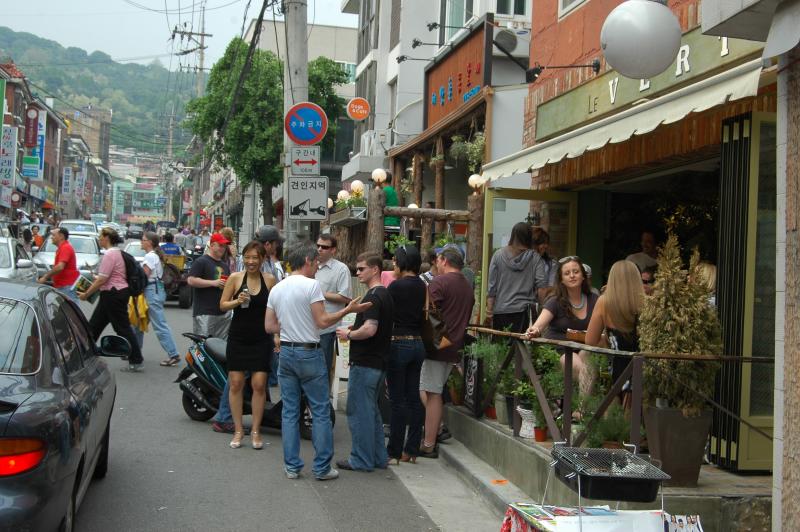
Also called the HBC Fest, the Haebangchon Festival is a treat for eyes and ears, but mostly the ears. Featuring dozens of acts by foreigners living in Korea (and a few international acts), few events can bring so many foreigners together in one place - which might be a good thing for the sake of traffic. Blocking off traffic wasn't an option, as the road leading uphill goes to the Seoul Tower and plenty of homes.
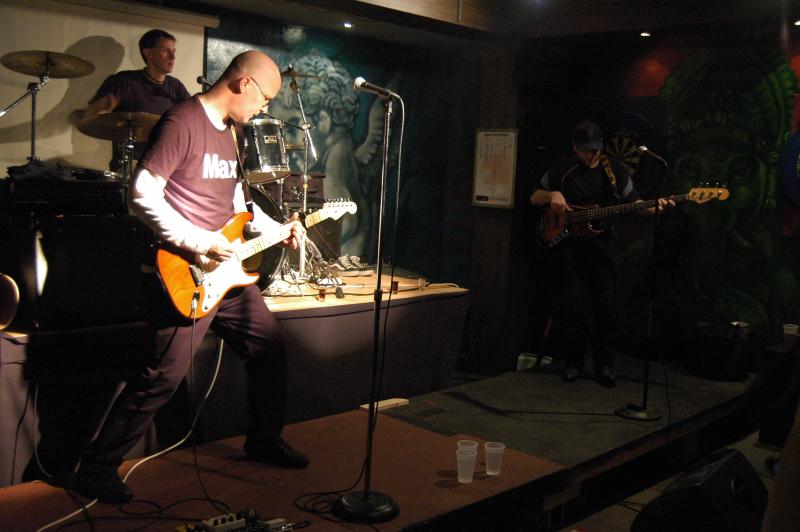
The Sejong Boys, featured at the New Phillies (AKA Phillies Downstairs).

The Guitar Hero contest over at Orange Tree - started a bit late, but still an interesting watch.
After meandering up the hill for some Korean grub, we headed back down to Haebangchon for some more music:
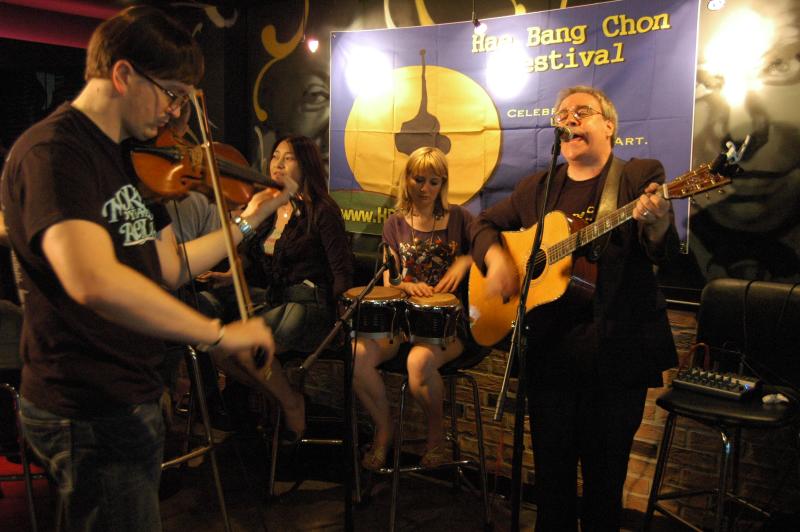
The only act featuring a fiddle (that I saw) - Luke Michielsen, over at Jacoby's.
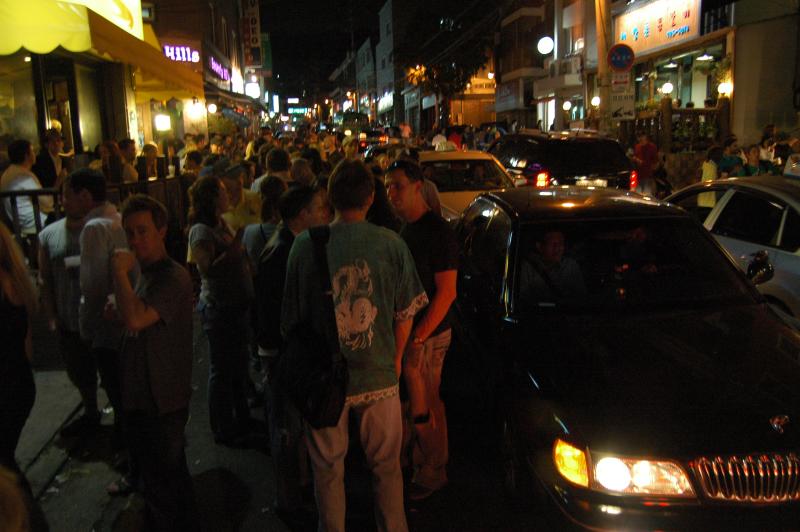
Haebangchon featured tight quarters all the way around - venues built for dozens tried to hold hundreds, while streets desperately needing sidewalks held plenty of foreigners while cars crept past an arm's length away. The main attraction almost seemed to be the crowd itself. Where neighborhoods like Itaewon are where the majority of foreigners party, Haebangchon is where quite a few of them live.
Speaking of Itaewon, the Lady in Red and I headed there to end our evening:
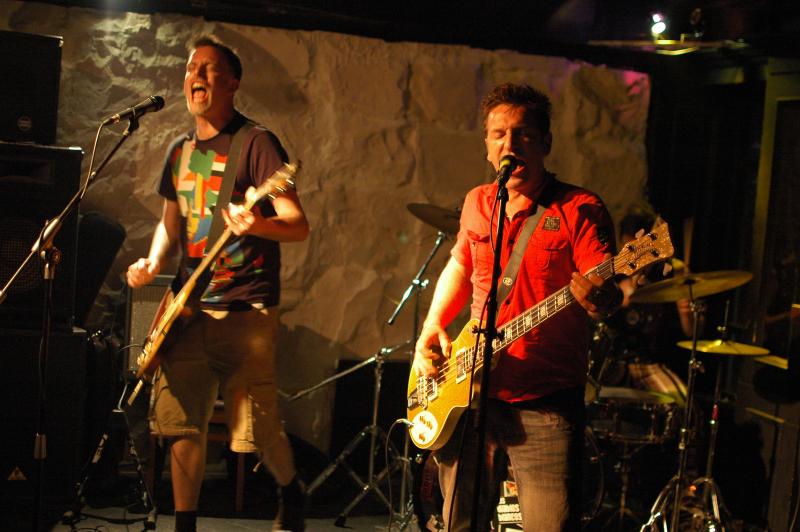
The last band on at Rocky Mountain Tavern, Mirrorhouse, offered up some original rock. The near-overwhelming crowd in Haebangchon, however, did not walk the kilometer or so to Itaewon - or had already had too much to drink...
The biggest problem was the crowd - numbering in the thousands, it's almost outgrown the space once dedicated to much smaller numbers. Next year's Haebangchon fest may need to be held elsewhere for the even-larger crowd expected - but it'll be a great party wherever it is. Another complaint was the almost complete lack of signage - if you're new to Korea or had no idea where Haebangchon is, you would have been lost. While the website was great at providing information, printed flyers containing the same information were much more difficult to find.
I'm happy to say I went to the event, and it's a great feeling to be surrounded by so many foreigners. I met up with quite a few people I hadn't seen in months, and otherwise socialized without fear of a language barrier. The few Koreans around seemed to be pretty sociable, and otherwise part of the expat community. How's that for an interesting reversal?
Ratings (out of 5 taeguks):
Ease to arrive:
Foreigner-friendly:
Convenience facilities:
Worth the visit:
This post was originally published on my blog, Chris in South Korea. If you are reading this on another website and there is no linkback or credit given, you are reading an UNAUTHORIZED FEED.
10 Magazine video contest - time to vote for your favorites
Fellow blogger Brian Dye (from Kiss my Kimchi!) submitted an entry, while Charles and Liz from the Seoul Suburban blog also put together a cool entry, though I didn't see any other familiar bloggers. Bloggers are a busy bunch - getting married, running national organizations, finishing academic papers, and so on.
Anyway, you'll find my humble entry below (embedded via YouTube - if it doesn't work try this URL or this direct link):
This post was originally published on my blog, Chris in South Korea. If you are reading this on another website and there is no linkback or credit given, you are reading an UNAUTHORIZED FEED.
Very Expensive Political Theater
 Today is Election Day for everyone from mayors to school board members throughout South Korea. It’s a day off from work, but judging from the four pages of ballots the more than 38,861,000 eligible voters have to deal with, it might take all day.
Today is Election Day for everyone from mayors to school board members throughout South Korea. It’s a day off from work, but judging from the four pages of ballots the more than 38,861,000 eligible voters have to deal with, it might take all day.
Each voter will be required to fill in four different ballot sheets in each of the two rounds of voting to select representatives for local governments and councils.
After presenting a valid ID, voters will be given four sheets for the first round of voting in which they will pick an education superintendent, a member of the education board and two council members ― one representing the province or city, the other for a smaller constituency, such as a county.
After marking the four sheets, voters will be required to put them in the ballot box.
Then they will move on to the next round of voting, in which they will select four more local representatives, including a governor, mayor or smaller administrative district chief, as well as party preferences for two councilors under the proportional representation system.
Gord Sellar has also colorfully expressed his feelings about another aspect of this – by South Korean standards $690 million is expensive – election. From a campaign jingle based on “Frosty the Snowman” I heard last night to the cacophony of visual noise, sometimes heaped atop another candidates’, on banners, bus panels, vans, sashes, t-shirts, business cards, and hand bills, a casual observer might think these elections are a sign of a healthy political culture. But, the noise obscures a lack of intelligent discourse.
It’s baffling that anything that might “affect the outcome of the elections” is banned, and this must, surely, be a poor translation or wording. I saw the candidates for the position of Mayor of Seoul on TV only a few weeks ago; I’m pretty sure it’d be illegal for me to post here what I thought of them — which ones seemed like Stepford Politicians ™ and which ones seemed a little more passable — but it’s also irrelevant… current events like a sunken submarine seem to have pushed things in one direction, and we can all guess which direction that is.
…Meanwhile, the election law also seems hellbent on preventing people from getting any real sense of the candidates: using Twitter as part of a campaign prior to 180 days before the election is forbidden. It was, apparently, a restriction intended to prevent rich people from taking advantage of the long lead-in to distribute materials. In the age of Social Networking, distributing information is free. Time to join planet earth in the 21st century, guys.
That’s a whole lot of money to spend on what most people don’t know how to do and for people and posts most people don’t recognize.
Filed under: Korea, Politics Tagged: elections, rok, South Korea

Question from a reader: personal questions
A reader writes in (question edited for length):
Hi, I am [T.R], I am 24 and I happened upon your blog while looking about living in Seoul. It said that you dont mind receiving emails, so I hope its ok if I pick your brain about information.
I just got my TESOL certification and I am looking into teaching young children in Seoul. I saw through your blog that you are really enjoying Korea and just wanted to get some perspective. I am a little nervous about committing to teaching and to Seoul because I have never taught a specific subject such as English. Nor have I ever taught by myself. Was Korea the first time you taught?
How was it like meeting people? Expats plus Koreans? I know one person in Seoul, so I will definitely need to meet more people.
I am really bad at learning languages and although I want to try to learn Korean I dont know how successful I will be. My friend says that I dont really need to learn Korean because everyone will talk to you in English. Do you know Korean and if not do you have a hard time getting along without it?
I dont usually have a hard time adjusting to a new place, I have lived in several countries but I feel as though I might have a hard time with Korea. Did you experience any difficulty?
Looking forward to hearing from you.
T.R.
I had been a teacher in the US - a T.A. in college for a couple years, as well as computer classes at my local library - but those experiences definitely didn't prepare me for teaching kids in a foreign country. It's a big culture shock, to be sure - one I'm sure every expat has had. I teach with an elementary school after-school program and evening classes to adults - two very different working environments, that's for sure.
There are literally tons of jobs around, and Korean parents put a lot of emphasis on their younger kids. Being a caring, concerned teacher will take you far, so simply mention your experience and any real-life examples to help you out. Bear in mind that few schools can or will guarantee your schedule or students. It goes without saying that some flexibility is required - but being picky means you usually get what you're looking for.
You'll get to know people without trying - just get out and do it. It's no different than moving to a new city in your home country where you don't know anyone. It's a process of discovery - the only real shortcut might be inheriting someone's brain...
FYI, I'm not very good at languages either. With time and repeated exposure, you pick up the basics. After a few months here, I could order at a restaurant, get in a taxi, etc. - most expats tend to plateau at the 'survival Korean' level unless they're genuinely interested in learning more. If you are, there are ample resources. Most people don't make Korea home for long enough to want to learn it, and it's not exactly helpful elsewhere in the world.
The biggest difficulty I had in adjusting to Korea was finding a balance. There's a Western life that can be had (McDonalds, KFC, Western-friendly-bars) and there's the Korean life (Korean food, traditions, etc.). At home, my life is distinctly Western; elsewhere, I try to make a balance between the two cultures.
There's lots more words I've already written on this and similar topics - check this link out for all the questions I've answered in the past.
This post was originally published on my blog, Chris in South Korea. If you are reading this on another website and there is no linkback or credit given, you are reading an UNAUTHORIZED FEED.
The Return of the Hui
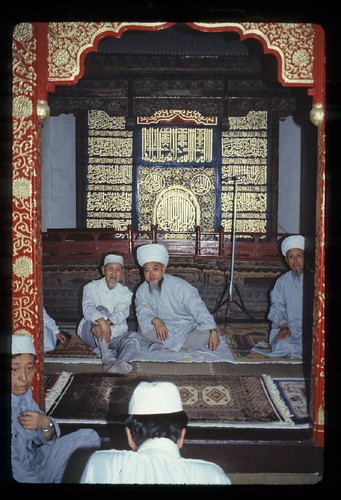 Razib Khan introduces the Hui, Chinese Muslims with a special legacy Beijing could take advantage of again.
Razib Khan introduces the Hui, Chinese Muslims with a special legacy Beijing could take advantage of again.
…I believe the Chinese Muslims can serve as a model to Muslims around the world who are minorities, and who are making the transition from being in nations to being of nations.
Intellectuals such as Tariq Ramadan are simply treading on the same ground Wang Daiyu and Liu Zhi did long ago, another instance of “it happened in China first.” Naturally the outcome will be different because Ramadan is a man of the West, and specifically the French intellectual world, which different tools and goals. But the principle is the same. Not only do Chinese Muslims serve as a model for how to exist within a plural society where Islam is not dominant, but it seems likely that within the next generation China will become the largest economy in the world and begin to reassert its conventional position as the preeminent power on this planet. Western Muslims are wont to assert that they have much to teach as members of the most dynamic contemporary societies, but it may be that in the 21stcentury Islam will start looking to the Far East. As Chinese geopolitical interests spread to the Middle East it would seem likely that just as Hui aided the expansion of the Manchu into Turkic Central Asia, so they would serve as intermediaries between Muslim nations and the Chinese government. Before the Asian Flu of the late 1990s Malaysian Prime Minister Mahathir Mohamed had given signals that perhaps the new developments in Islam would come from Southeast Asia. But while the economies of ASEAN are relatively quiescent China is a relative dynamo, and it will be interesting to see what changes are wrought among its Muslims, and these these Muslims might eventually shape the nature of the conversation in the Muslim world as a whole.
I also found another website, Islam in China.
Filed under: Central Asia, East Asia, Social Science Tagged: china, hui, islam, Middle East, muslims, prc, silk road, zheng he










 RSS Feed
RSS Feed






Recent comments